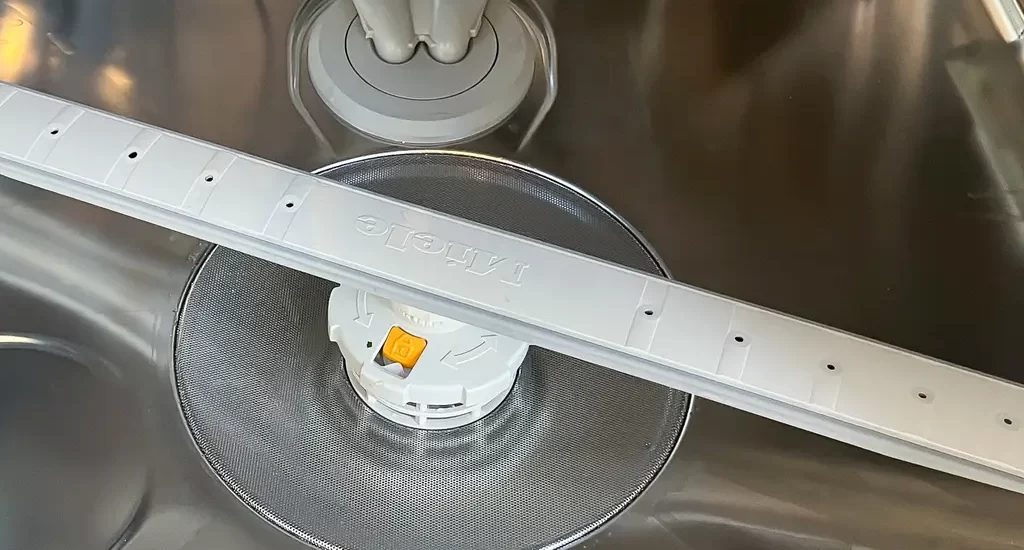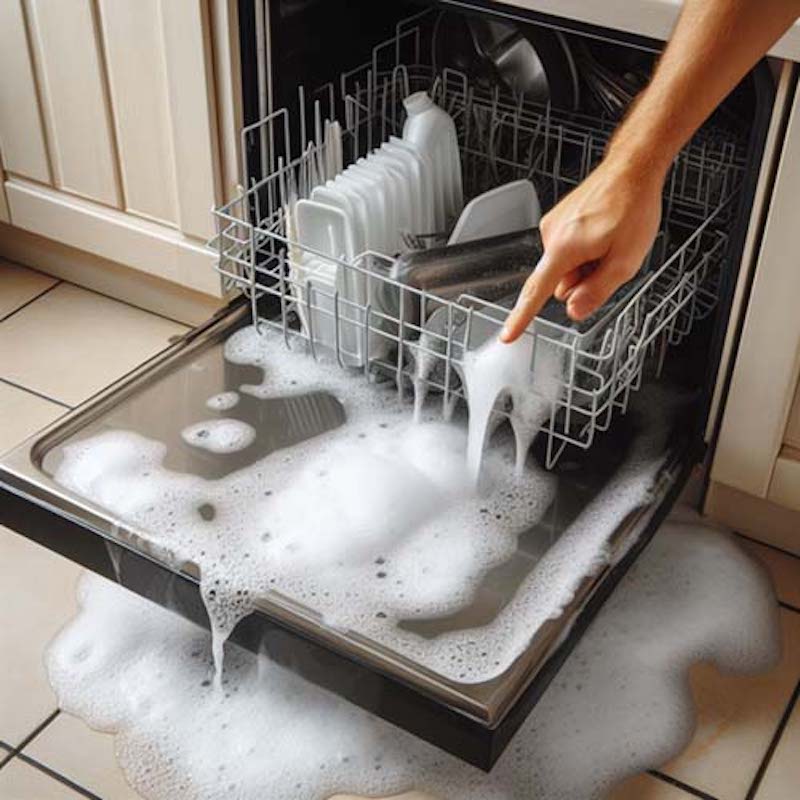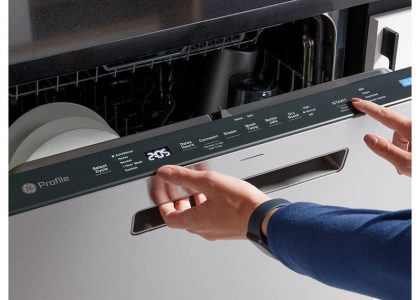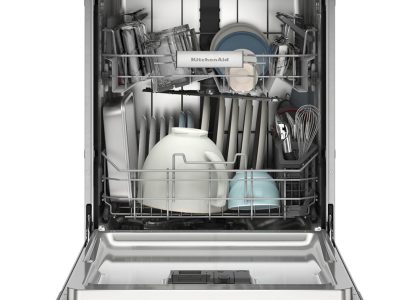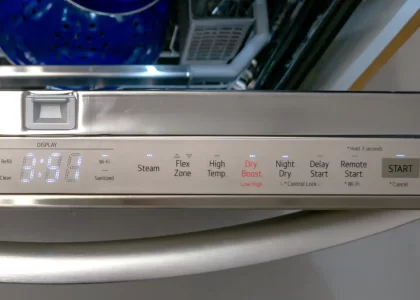Identifying the Source of Dishwasher Odor
How to get rid of dishwasher smell? Before you dive into cleaning, you’ll want to pinpoint what’s causing that lingering dishwasher smell. Common culprits include food buildup, clogged filters, and trapped grease. Debris can collect in areas like the drain filter, spray arms, and door seals. Sometimes, you might also find mold growing in damp, hidden spots or items like melted plastic causing odors.
Break down what you’re dealing with to target your cleaning efforts effectively:
- Food Buildup: Small bits of food stuck in the dishwasher can rot and create unpleasant odors.
- Clogged Filters: Trapped particles in manual filters lead to smells and reduced efficiency.
- Grease and Soap Scum: These can coat the walls and door gasket, further contributing to the stench.
- Mold Growth: A warm and moist interior is ideal for mold and can give off musty smells.
- Melted Plastic: Overheated plastic items can emit a chemical or burning odor.
Be thorough in your search for the source. Look under the lower rack, inspect the filter area, and peek at the spray arm nozzles. Addressing the right place makes all the difference in eliminating odors. Regular upkeep, like rinsing dishes before loading, can prevent these issues from coming back.
Stay tuned for the next steps where we’ll tackle cleaning and maintenance to get your dishwasher smelling fresh!
Steps to Clean the Drain Filter
To eliminate bad dishwasher smells, start with the drain filter. Often, it’s home to food particles and residue that can cause odors. Regular cleaning can prevent these issues. Here’s a simple guide on how to do it:
- Locate and Remove the Filter: It’s usually at the dishwasher’s base. Remove the lower rack for better access and take out the filter.
- Clean the Filter: Rinse the filter with warm, soapy water. Scrub gently with a soft brush to avoid damage and remove trapped debris.
- Check the Drain: While the filter’s out, inspect the drain area. Clear out any lodged food or gunk you find there.
- Replace the Filter: Dry the filter and place it back securely. Make sure it’s properly locked in to avoid issues.
Aim to clean the filter monthly if you use your dishwasher regularly. It’s a simple task that keeps your dishwasher odor-free and effective.
Cleaning and Unclogging the Spray Arms
To effectively clean and unclog dishwasher spray arms, follow these clear steps:
- Remove the Spray Arms: Access the spray arms by pulling out the bottom rack. You may need to unclip or twist them off.
- Inspect for Clogs: Look closely at the holes in the spray arms. Check for stuck food particles or mineral buildup.
- Clean Thoroughly: Rinse the arms under warm water. Use a small brush or a toothpick to clear blockages.
- Reattach the Spray Arms: Make sure they snap back into place correctly and are secure.
Through regular maintenance, remove residue that could hinder your dishwasher’s performance and cause smells.
Dealing with Stubborn Interior Residue
To combat stubborn residue inside your dishwasher, focus on the machine’s walls, door, and gaskets. Grease, soap scum, and food remnants often cling to these areas and contribute to bad smells. Follow these steps to clean them effectively:
- Empty the Dishwasher: Make sure there are no dishes or utensils inside.
- Prepare Your Cleaning Solution: Mix warm water with a mild dish detergent.
- Wipe the Interior Surfaces: Dip a soft cloth or sponge in the solution and scrub the walls, door, and bottom of the dishwasher.
- Pay Attention to Door Seals: Clean around the door gasket carefully, as residue tends to accumulate in these crevices.
- Rinse Away the Grime: After scrubbing, rinse the surfaces with a cloth dampened with clean water.
- Dry Thoroughly: Wipe down all surfaces with a dry cloth to prevent moisture buildup.
By regularly cleaning these key areas, you can prevent the buildup that causes those persistent bad smells. For a deeper clean, consider using a mixture of baking soda and water to create a paste for scrubbing away tougher grime. Always eliminate any standing water in the dishwasher by thoroughly drying the interior after cleaning. This practice will not only reduce odor but also enhance overall cleanliness and efficiency.
Neutralizing Odors with Vinegar and Baking Soda
How to get rid of dishwasher smell? To remove stubborn smells from your dishwasher, vinegar and baking soda are effective, natural cleaners. Here’s how you can use them:
- Use Vinegar: Pour a cup of white vinegar into a dishwasher-safe bowl. Set it on the top rack of an empty dishwasher. Run a hot wash cycle. The vinegar will help dissolve grime and neutralize odors.
- Apply Baking Soda: After the vinegar cycle, sprinkle a cup of baking soda across the bottom of the dishwasher. Run a short hot wash cycle. Baking soda absorbs tough odors and cleans residue.
- Repeat if Necessary: For deep-set smells, repeat the process. This double action can cut through lingering odors and leave your dishwasher smelling fresh.
Remember, do not mix vinegar and baking soda in the same cycle, as they can react and create foam. Clean your dishwasher this way monthly to keep it smelling nice.
Checking and Maintaining the Drain Hose
To address dishwasher smells, don’t overlook the drain hose. A poorly maintained hose can trap odors. Here’s a quick maintenance guide:
- Find the Hose: Locate the hose connected to the dishwasher and sink.
- Inspect for Kinks: Ensure the hose isn’t twisted or bent, which could block water flow.
- Check for Clogs: Look for trapped food or debris that might cause odors or poor drainage.
- Clean or Replace: Clear any blockages, or replace the hose if damaged or worn.
Regularly check the drain hose every few months. This will help prevent smells and keep your dishwasher working well.
Preventing Future Dishwasher Smells
After tackling dishwasher odors, it’s crucial to stop them from returning. How to get rid of dishwasher smell? Here are effective steps to ensure a clean, fresh-smelling dishwasher:
- Run Regular Maintenance: Clean the filter, spray arms, and drains once a month. This prevents buildup and keeps odors away.
- Scrape Dishes Before Loading: Removing food residue reduces the chance of particles getting trapped and causing smells.
- Use the Correct Detergent: Choose a detergent that matches your dishwasher’s requirements and water type to avoid excess suds and residue.
- Perform Routine Interior Cleanings: Wipe down the inside of the dishwasher every few weeks with a mild cleaner to keep the interior fresh.
- Keep the Dishwasher Dry: After each use, leave the door ajar to air out the interior and prevent mold.
- Consider Rinse Aids: These can help reduce spots and smells. Follow the manufacturer’s guidelines for use.
By following these simple maintenance tips, you can reduce the risk of future dishwasher smells. For persistent odors, a deeper clean or professional advice might be necessary. Don’t let bad smells linger; address them quickly to maintain a pleasant kitchen environment.
When to Seek Professional Appliance Servicing
Even after following these intensive cleaning and maintenance tips, some dishwasher smells might persist. In such cases, it’s best to turn to professional appliance servicing for help. Skilled technicians can diagnose hidden issues that are not easy to spot or solve on your own.
Signs You Need a Professional’s Help
- Recurring smells: If odors return soon after cleaning, this could indicate a deeper problem.
- Poor drainage: Water left at the bottom of the dishwasher may point to a drain issue beyond simple clogs.
- Strange noises: Unusual sounds during operation could be a sign of mechanical failures.
- Visible mold: Stubborn mold that doesn’t go away with your cleaning efforts needs professional attention.
Benefits of Professional Servicing
- Thorough inspection: Experts can identify problems such as worn parts or electrical issues.
- Effective solutions: Professionals have the right tools and knowledge to provide lasting repairs.
- Prevents further issues: Addressing problems early with expert help can save you from bigger, costly repairs.
- Ensures safety: Professionals ensure that your dishwasher is safe to use, avoiding hazards like electrical malfunctions.
How to get rid of dishwasher smell? If your dishwasher issues align with these signs, don’t hesitate to seek professional help. Regular servicing can prolong the life of your dishwasher and ensure it runs efficiently, keeping bad smells at bay. Remember, a clean dishwasher is just as essential as clean dishes.

